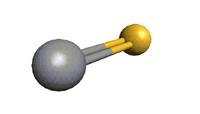|
Details of the global fit involving several isotopomers are
available in
(1) H. S. P. Müller, F. Schlöder, J. Stutzki, and G. Winnewisser,
2005, J. Mol. Struct. 742, 215.
The pure rotational lines were taken from
(2) M. Bogey, C. Demuynck, and J. L. Destombes,
1981, Chem. Phys. Lett., 81, 256; from
(3) M. Bogey, C. Demuynck, and J. L. Destombes,
1982, J. Mol. Spectrosc., 95, 35; from
(4) V. Ahrens and G. Winnewisser,
1999, Z. Naturforsch. 54a, 131;
(5) E. Kim and S. Yamamoto,
2003, J. Mol. Spectrosc., 219, 296;
and from
(6) C. A. Gottlieb, P. C. Myers, and P. Thaddeus
2003, Astrophys. J., 588, 655.
Infrared transitions v = 1 – 0 for several isotopomers
and v = 2 – 1 for the main isotopomer by
(7) J. B. Burkholder, E. R. Lovejoy, P. D. Hammer, and C. J. Howard 1987,
J. Mol. Spectrosc. 124, 450;
v = 1 – 0 to v = 9 – 8 of the
main isotopomer by
(8) R. S. Ram, P. F. Bernath, and S. P. Davies,
1995, J. Mol. Spectrosc. 173, 146;
and
v = 2 – 0 of the main isotopomer by
(9) R. J. Winkel, Jr., S. P. Davies, R. Pecyner, and J. W. Brault;
1984, Can. J. Phys. 62, 1414
were also used in the fit.
In general, lines deviating from their calculated position by
more than 2.5 times their uncertainties have been omitted from
the final fit. Transition frequencies with
uncertainties >= 100 kHz have not been merged.
Note:The partition function given below
takes into account the 13C hyperfine splitting !
It should be pointed out that the precision of the infrared transitions
is 0.003 cm–1 or 9 MHz for
lower vibrational bands, the accuracy may be somewhat smaller.
With this in mind, the predictions should be rather reliable
throughout.
The transition dipole moment was assumed to be identical to
that of the respective band of the main isotopic species,
see e044510.cat.
All vibrational states used in the fit have been considered
for the calculation of the partition function. Contributions
of the individual vibrations are given in parentheses.
|
